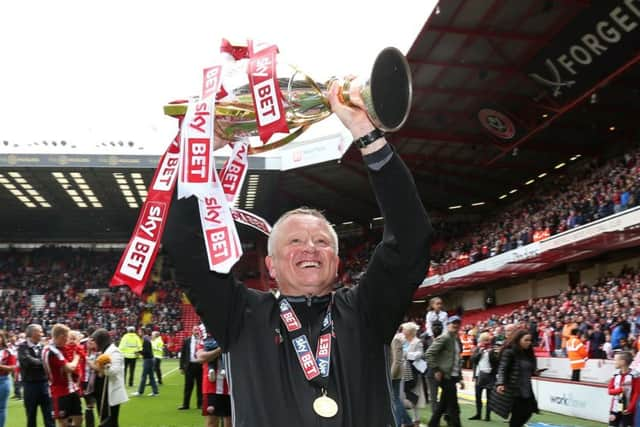Sheffield United: Are lower-league signings right for the Blades? Chris Wilder has his say


Bristled at suggestions that, to achieve at Championship level, you must open the cheque book and spend big.
But the Sheffield United manager is determined to adopt a different approach by proving that knowledge is power in the transfer market, not pounds, shillings and pence.


Advertisement
Hide AdAdvertisement
Hide Ad“I’ve said all along, it’s not Championship Manager, looking at players on a computer and how much they are worth,” he says. “We’ve pulled lads from the Championship, League One and League Two. I’m not ashamed about that.”
Wilder is sitting in his office at Bramall Lane as, surrounded by the detritus of the club’s promotion celebrations, he sheds light on its recruitment policy. The 49-year-old who, together with assistant Alan Knill, was responsible for masterminding last term’s League One title triumph, has eschewed big-name, statement signings since taking charge 13 months ago. It is a strategy which has not only delivered results on the pitch - United amassed 100 points during his first season at the helm, 14 more than second-placed Bolton Wanderers - but protects them off it too.
“We know we want to progress and we know we have to raise the bar financially,” Wilder explains. “(Co-owner) Kevin (McCabe) knows that too. But we want to do it in a structured way that doesn’t ever put the club at risk. You hear people talking about taking a gamble. Well, that’s fine until you lose.”
United’s return to the second tier of English football following six years in the wilderness has prompted calls for Bramall Lane’s board of directors to loosen the purse strings ahead of meetings with the likes of Aston Villa, Derby County and Wolverhampton Wanderers. Wilder, despite acknowledging the need for increased funding, insists it would be a mistake to begin splashing the cash.


Advertisement
Hide AdAdvertisement
Hide AdUnited, he argues, must find different ways to compete in a division some have dubbed ‘The Casino League’. “We can get better and keep moving forward in our own structured way by making sure the recruitment is right,” he says. “Look at (John) Fleck, Jack O’Connell, Jake Wright and Simon Moore. They all came in last year and, although they probably weren’t the names being touted around by many people, they all made huge contributions to what the team achieved.”
Figures released by the Premier League revealed that eight Championship teams last season received parachute payments ranging from just over £16 million to, in the case of Villa, nearly £41m. Wilder, calculating that United can not match their rivals when it comes to fees or wages, has purposefully based his rebuilding programme on intelligence rather than financial largesse.
Paul Mitchell, United’s head of scouting and recruitment, has been charged with building a contacts network capable of identifying players with the necessary talent and, in the case of Fleck and Wright last summer, at the end of their contracts.
Enda Stevens, the former Aston Villa defender, has arrived this summer on a free transfer from Portsmouth while Ched Evans and Nathan Thomas, previously of Chesterfield and Hartlepool, have both been purchased for nominal sums.
Advertisement
Hide AdAdvertisement
Hide Ad“You have to identify different players in different areas,” Wilder says. “You have to know who they are and what’s going on elsewhere that might mean they become available. That aspect of recruitment, and tallying it in with your own needs, is a key.”
Of course, United’s decision to focus on emerging or under-rated names, not those whose reputations are already established, has provided their well-numerated detractors with plenty of ammunition. But Wilder subscribes to Abraham Lincoln’s theory that “investment in knowledge pays the best rate of interest”.
“Jamie Vardy, when he went to Leicester, didn’t play in the Championship,” he continues. “Dele Alli didn’t play in the Championship. Look at Bournemouth - Harry Arter played for Woking. I don’t think Bournemouth fans are looking at Harry Arter and thinking ‘well he’s non-league’. He’s a Premier League player.
“It’s not about getting sucked in because of where they’ve been before or who they might have on their CV. It’s about, what can they do for us? How can they fit into this football club? Is the price right for this football club too? Do they add to what we’ve got, going forward?”
Advertisement
Hide AdAdvertisement
Hide AdWilder’s squad already looks equipped to compete at a higher level, with nearly three-quarters of those who featured last term boasting Championship experience. Six, including Chris Basham and Samir Carruthers, come with top-flight pedigree.
“If people think we don’t know what we’re walking into then they’re wrong,” Wilder, shaking his head in disbelief, grins. “We’ve watched plenty of games. The same goes for the lads as well. A lot of them have been up there already. The ones coming in are designed to supplement what we’ve got, bring different qualities and traits. We don’t need to start over again, no way, but we do want to build and strengthen. That’s why we’ve been doing business.”
Evans, previously of Manchester City, is well known to supporters, having scored 48 goals in 113 appearances for United before returning to the game, following a well-documented legal issue, at the Proact Stadium. Thomas, who attracted interest from Middlesbrough before leaving the Victoria Ground, has untapped potential, while Stevens, Portsmouth’s reigning Player of the Year, has been tracked by Wilder for several seasons.
“We watch these players and we ask, what are they going to be like with better players? What’s Nathan, with all respect to where he’s come from, going to be like with Paul Coutts and John Fleck around him? What’s he going to be like with Mark Duffy and Billy Sharp? Can we organise him a little bit more and will he get better? We’re confident he can.”